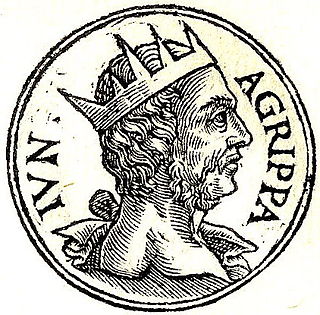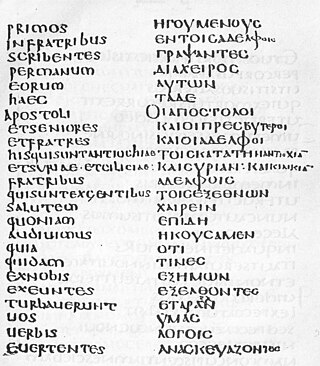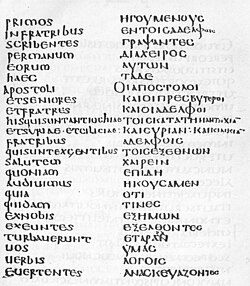
Herod Agrippa, also known as Herod II or Agrippa I, was the last Jewish king of Judea. He was a grandson of Herod the Great and the father of Herod Agrippa II, the last known king from the Herodian dynasty. He was acquaintance or friend of Roman emperors and even played crucial roles in internal Roman politics.

Herod Agrippa II, officially named Marcus Julius Agrippa and sometimes shortened to Agrippa, was the last ruler from the Herodian dynasty, reigning over territories outside of Judea as a Roman client. Agrippa II fled Jerusalem in 66, fearing the Jewish uprising and supported the Roman side in the First Jewish–Roman War.

Berenice of Cilicia, also known as Julia Berenice and sometimes spelled Bernice, was a Jewish client queen of the Roman Empire during the second half of the 1st century. Berenice was a member of the Herodian Dynasty that ruled the Roman province of Judaea between 39 BC and 92 AD. She was the daughter of King Herod Agrippa I and Cypros and a sister of King Herod Agrippa II.

Antonius Felix was the 4th Roman procurator of Judea Province in 52–60, in succession to Ventidius Cumanus. He appears in the New Testament, in the book of Acts, chapters 23 and 24, where the Apostle Paul is brought before him for a trial.

Herod Archelaus was the ethnarch of Samaria, Judea, and Idumea, including the cities Caesarea and Jaffa, for nine years. He was the son of Herod the Great and Malthace the Samaritan, brother of Herod Antipas, and half-brother of Herod II. Archelaus came to power after the death of his father Herod the Great in 4 BC, and ruled over one-half of the territorial dominion of his father. Archelaus was removed by the Roman emperor Augustus when Judaea province was formed under direct Roman rule, at the time of the Census of Quirinius.

Judaea was a Roman province from 6 to 132 CE, which incorporated the Levantine regions of Judea, Samaria and Idumea, extending over parts of the former regions of the Hasmonean and Herodian kingdoms of Judea. The name Judaea was derived from the Iron Age Kingdom of Judah.

Porcius Festus was the 5th procurator of Judea from about 59 to 62, succeeding Antonius Felix.
Ventidius Cumanus was the Roman procurator of Iudaea Province from AD 48 to c. AD 52. A disagreement between the surviving sources, the Jewish historian Josephus and the Roman Tacitus, makes it unclear whether his authority was over some or all of the province. Cumanus' time in office was marked by disputes between his troops and the Jewish population. Ventidius Cumanus failed to respond to an anti-Jewish murder in Samaritan territory which led to the violent conflict between Jews and Samaritans. Following an investigation by the governor of Syria, Gaius Ummidius Durmius Quadratus, Cumanus was sent to Rome for a hearing before the Emperor Claudius, who held him responsible for the violence and sentenced him to exile.

Julia Drusilla was a daughter of Herod Agrippa, King of Judaea and Cypros and the sister of Berenice, Mariamne and Herod Agrippa II. Her son, Agrippa, was one of the few people known by name to have died in the eruption of Mount Vesuvius in 79 AD.
Lucceius Albinus was the 6th Roman Procurator of Judea from 62 until 64 and the governor of Mauretania Tingitana from 64 until 69.
The procuratorial coinage of Roman Judaea was minted by the prefects and procurators of the province between AD 6 and 66 in only one denomination and size, the bronze prutah.

Acts 12 is the twelfth chapter of the Acts of the Apostles in the New Testament of the Christian Bible. It records the death of the first apostle, James, son of Zebedee, followed by the miraculous escape of Peter from prison, the death of Herod Agrippa I, and the early ministry of Barnabas and Paul of Tarsus. The book containing this chapter is anonymous, but early Christian tradition uniformly affirmed that Luke composed this book as well as the Gospel of Luke.

Acts 8 is the eighth chapter of the Acts of the Apostles in the New Testament of the Christian Bible. It records the burial of Stephen, the beginnings of Christian persecution, and the spread of the Gospel of Jesus Christ to the people of Samaria and Meroe. The book containing this chapter is anonymous, but early Christian tradition uniformly affirmed that Luke composed this book as well as the Gospel of Luke.

Acts 11 is the eleventh chapter of the Acts of the Apostles in the New Testament of the Christian Bible. It records that Saint Peter defends his visit to Cornelius in Caesarea and retells his vision prior to the meeting as well as the pouring of Holy Spirit during the meeting. The book containing this chapter is anonymous but early Christian tradition uniformly affirmed that Luke composed this book as well as the Gospel of Luke.

Acts 21 is the twenty-first chapter of the Acts of the Apostles in the New Testament of the Christian Bible. It records the end of Paul's third missionary journey and his arrival and reception in Jerusalem. The book containing this chapter is anonymous, but early Christian tradition uniformly affirmed that Luke composed this book as well as the Gospel of Luke.

Acts 23 is the twenty-third chapter of the Acts of the Apostles in the New Testament of the Christian Bible. It records the period of Paul's imprisonment in Jerusalem then in Caesarea. The book containing this chapter is anonymous but early Christian tradition uniformly affirmed that Luke composed this book as well as the Gospel of Luke.

Acts 24 is the twenty-fourth chapter of the Acts of the Apostles in the New Testament of the Christian Bible. It records the period of Paul's imprisonment in Caesarea. The book containing this chapter is anonymous but early Christian tradition uniformly affirmed that Luke composed this book as well as the Gospel of Luke.

Acts 26 is the twenty-sixth chapter of the Acts of the Apostles in the New Testament of the Christian Bible. It records the period of Paul's imprisonment in Caesarea. The book containing this chapter is anonymous, but Holman states that "uniform Christian tradition affirms that Luke wrote both" this book as well as the Gospel of Luke, as supported by Guthrie based on external evidence.
The Egyptian (Ha-Mitzri) was a 1st-century Jewish prophetic figure, sometimes described as a sign prophet or a messianic prophet. He is said to have assembled a sizable gathering of followers atop the Mount of Olives either in preparation of an assault of Jerusalem in order to establish himself as the ruler of the people, or in the expectation that he would miraculously cause the walls of the city to fall, allowing his followers to enter the city. This group was crushed by the Roman procurator of Judaea, Antonius Felix, and the Egyptian fled, while many of his followers were killed and captured, with the remainder managing to flee and hide. The campaign was initially supported by Helena of Adiabene and but repressed by Herod Agrippa II.

Cypros (1st-century) was a queen consort of Judea. She was married to king Herod Agrippa.

















